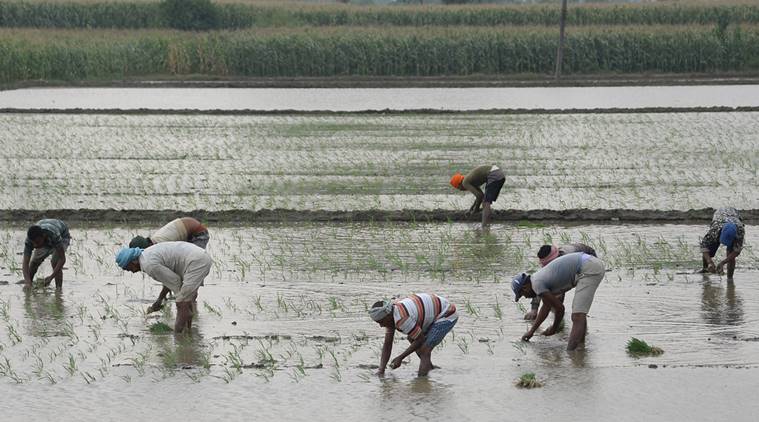 Farm workers sowing paddy in a field in cloudy weather at a village in Jalandhar on Wednesday. (Express Photo)
Farm workers sowing paddy in a field in cloudy weather at a village in Jalandhar on Wednesday. (Express Photo)
Amid scarcity of workers, farmers began transplantation of paddy, the popular conventional and highly labour intensive method of paddy sowing in Punjab on Wednesday. Though the state government is also encouraging them to opt for direct seeding of rice (DSR), a less labour-intensive method but large number of farmers in Punjab go for transplantation method.
There was a 40-50 per cent increase in rates of transplantation per acre, which witnessed an increase from Rs. 3000 per acre to between Rs. 5000 to 6000 this year because of the shot supply of labour. Majority of the fields remained vacant and in most villages, only a couple of farmers could start transplantation due to non-availability of labourers due to the Covid-19 pandemic.
After seeing the situation on day 1, several farmers were forced to send vehicles to Uttar Pradesh and Bihar on Wednesday to bring labour from there or offer them advance payment.
Paddy transplantation is a labour intensive exercise in which at least two-three workers per acre are required. In several villages, local khet mazdoor refused to take up the work.
In villages of Jalandhar district like Nangal Shama, Dhilwan, Muzzafarpur, Patara, Johal, Bolina, Dakoha, Puranpur, Talhan, Sinkanderpur, Alawalpur, Chandpur, Jandhushinga, Kapur and Chuharwalia, majority farmers complained of shortage of labour despite availability of khet mazdoor.
Farmer Jaspal Singh of Nangal Shama said there is no labourer available in their village and thus he approached the local khet mazdoor to take up his work, but they refused to take up transplantation.
In Semi village, transplantation took place in only one area where nine persons from Bihar’s Araria district were working under their leader Mukesh Kumar.
“We all had come to Punjab in February before lockdown for potato harvesting. Since we also have the expertise of paddy transplantation our landlord requested us to stay back till paddy sowing,” said Mukesh, adding that they had got registered to return to Bihar by Shramik trains but did not get seats.
“But now we feel that it had happened for good as we are now earning Rs 1,000 each daily as we got work to transplant paddy in 70 acres at the rate of Rs 5,000 per acre while it was only Rs 3,000 rate per acre last year,” he added.
Mukesh said that this time there is no labour, because of which they are getting an all-time high rate of paddy transplantation.
Sunil Paswan, another labourer from Saharsa district of Bihar, was transplanting paddy in the fields of farmer Jaskaran Singh of Salempur village along with his entire family including wife, her parents and other relatives and was happy that he will earn a good amount this year.
“We are 10 people and will rope paddy plants on 50 acres of land at a rate of Rs 4,500 to Rs 5,000 per acre,” said he, adding that last year they got Rs 2,700 per acre.
“We had also got registered to go back to our native places by train but then these trains stopped and we also stayed back,” he said.
Same was the opinion of labourer Vipin Yadav who was busy in transplanting in Talhan Village.
Farmers are however quite worried. Talwinder Singh of Nauli village has to sow 55 acres including 45 acres under paddy and 10 acres under basmati, but no labour was available while local khet mazdoor are demanding Rs 7,000 per acre.
“After seeing the situation, I sent two Innova vehicles to Uttar Pradesh to bring 12 labourers which will cost Rs 35,000 and I will share 50 per cent of the cost,” he said, adding that local labour is not ready to work in their village.
“There is no doubt about the shortage of labour in Punjab but farmers are managing on their own with the help of local khet mazdoor, some migrant labourers and by DSR method,” said Director, Punjab Agriculture Department, Dr Sutantra Airi.
In Punjab, 27 lakh hectares under paddy is the target, including 7 lakh under basmati, out of which direct sowing has already taken place on 2 lakh hectares.
In Punjab, PAU-invented short duration paddy varieties like PR-126, PR 127, PR 121, PR 122, PR 127 and PR 114 varieties are primarily being sown as these are 123 to 130 days duration varieties including the nursery period of 25 to 30 days.